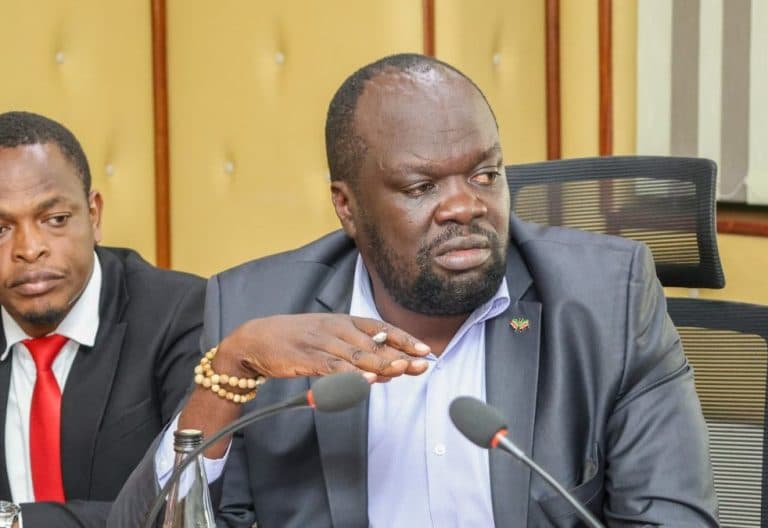We're loading the full news article for you. This includes the article content, images, author information, and related articles.
Kileleshwa MCA Robert Alai has declared unconditional support for President Ruto in 2027, exposing deep ideological fissures within the Orange Democratic Movement as it navigates its post-Raila Odinga future.

Kileleshwa Member of County Assembly Robert Alai on Monday, November 3, 2025, ignited a political firestorm by accusing leaders of his own Orange Democratic Movement (ODM) party of attempting to “blackmail” President William Ruto. In a series of bold statements, Alai declared that ODM would support President Ruto’s re-election in 2027 without any preconditions, a move that starkly contradicts the position of other senior party officials and reveals the widening cracks within Kenya's largest opposition party.
In a statement posted on his social media accounts, Alai cautioned fellow party members against issuing ultimatums to the Head of State in exchange for political support. “ODM leaders must avoid blackmail as a currency in their engagements with H.E. William Ruto,” Alai stated on Monday. He argued that such high-stakes negotiations were a preserve of the party's late leader, Raila Odinga, due to his unique political stature. “Anyone from ODM giving Ruto conditions is on a thin line of blackmail which we won't allow or entertain,” he added, declaring, “We are going to 2027 as ODM to support President Ruto WITHOUT CONDITIONS.”
Alai's declaration comes at a time of profound uncertainty and internal conflict for ODM, following the death of its founder, Raila Odinga, on October 15, 2025. The party is currently grappling with a succession battle and a fundamental debate over its future direction. One faction, reportedly led by Secretary-General Edwin Sifuna and Siaya Governor James Orengo, maintains that the party should field its own presidential candidate in 2027, honouring what they claim were Odinga's final instructions. This group has actively resisted calls for the party to fully integrate with President Ruto's administration.
Conversely, another camp, which includes Alai and several leaders serving in the Kenya Kwanza government, advocates for closer cooperation, arguing it aligns with the spirit of the broad-based government agreement forged between Odinga and Ruto before his passing. Alai's latest salvo appears to be a direct challenge to the party's interim leader, Dr. Oburu Oginga, who recently stated that ODM would not support any alliance in 2027 without securing the Deputy President slot. This demand for a power-sharing agreement is precisely the kind of “condition” Alai has branded as blackmail.
President Ruto's administration has actively pursued a strategy of making development inroads into opposition strongholds, particularly in Western Kenya and Nyanza. In a recent tour of Kakamega and Vihiga counties, the President unveiled projects worth Ksh. 21 billion, emphasizing his commitment to equitable development regardless of political affiliation. This approach puts opposition leaders in a difficult position: either cooperate with the government to bring projects to their constituents or risk being portrayed as anti-development obstructionists.
President Ruto has consistently challenged the opposition to present alternative development plans rather than engaging in what he terms “empty rhetoric.” This development-focused narrative appears to have found a receptive audience in leaders like Alai, who have pivoted from being staunch government critics to aggressive defenders of the broad-based government.
The public infighting highlights the monumental task facing ODM as it attempts to forge a new identity. The party's central committee has officially reiterated its commitment to the broad-based government until 2027, a stance aimed at projecting unity. However, the conflicting public statements from senior leaders like Alai, Sifuna, and Oburu Oginga suggest a deep-seated struggle for control and ideological direction.
Alai's provocative stance, including a Luo cultural metaphor comparing President Ruto to a trusted “uncle” guiding the family after the father’s passing, has been interpreted by his critics as a clear signal of his intent to align with the ruling UDA party. As the 2027 election cycle draws nearer, the pressure within ODM is likely to intensify. The party must navigate the legacy of its iconic founder while contending with ambitious leaders pulling in different directions. Whether it can resolve these internal contradictions and present a united front remains a critical question for Kenya's political landscape.
Keep the conversation in one place—threads here stay linked to the story and in the forums.
Other hot threads
E-sports and Gaming Community in Kenya
Active 8 months ago
The Role of Technology in Modern Agriculture (AgriTech)
Active 8 months ago
Popular Recreational Activities Across Counties
Active 8 months ago
Investing in Youth Sports Development Programs
Active 8 months ago
Key figures and persons of interest featured in this article